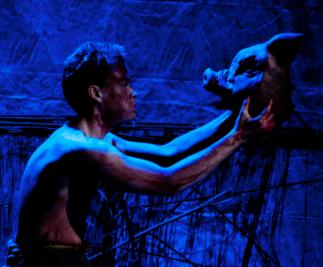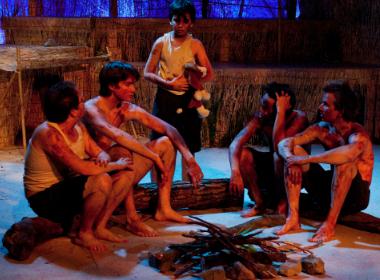
"I think everyone has pondered being stranded on a deserted island," says actor Kyle Murray. Credit: Seanna Kennedy Photography
A plane full of adolescent British schoolboys crash-lands on a deserted island, and the boys quickly begin to give into base impulses and desires. High-concept Bel Ami video? Well, to be fair, it probably is. But it’s also William Golding’s Lord of the Flies, that seminal piece of literature you were probably supposed to write an essay on in Grade 11.
It’s one of those works of fiction so ingrained in popular culture that you likely know the plot even if you’ve never read it, thanks to multiple film adaptations (not to mention that Simpsons episode). You can now see a brand-new take on the story at the Lower Ossington Theatre. Xtra spoke with two of the queer actors in LOT’s upcoming Lord of the Flies — Kyle Murray and Alex Plouffe — about their experiences working on the show.
“The amazing thing about Lord of the Flies is how relatable the story is,” says Plouffe, who plays Bill. “As children, we all dream of a utopia beyond rules or authority where freedom reigns supreme. Golding explores this idea but with realistic consequences; how a society without rules run by formerly suppressed adolescents cannot sustain itself.”
Murray, who plays Simon, the most peaceful of the boys, thinks the story taps into something universal. “I think everyone has pondered being stranded on a deserted island,” he says. “What would you do for food, shelter, livelihood, et cetera? Basically, when things get tough, what do you resort to?”
One aspect of Lord of the Flies that has been the subject of scholarly debate for many years is whether Golding intended the homoerotic subtext many readers find in the work. “After being alone for a number of months on an island, a need for comfort and intimacy would arise,” Murray says.
While it’s not something the production addresses head-on, director Darcy Evans hasn’t ignored it either. “We discussed with Darcy early on the idea of a variety of young men in the prime of puberty stuck together on an island for months and what that would mean for them,” Plouffe says. While you probably can’t expect any Bel Ami-esque hijinks, some actors may choose to imbue their characters with a queer subtext. “Darcy allowed us to explore these ideas individually,” Plouffe explains, “making character choices based on what it was we thought our characters would need most after a substantial amount of isolation.”
Of course, Lord of the Flies isn’t all island adventure and longing glances. More Lost than Swiss Family Robinson, the body count climbs as paranoia, superstition and human cruelty pit the boys against each other. Given the current place The Hunger Games holds in the zeitgeist, it’s impossible not to draw comparisons to that other story about deadly youths surviving in a remote area. But Murray contends that Flies has “so much more to offer” than the YA potboiler, in part because of its more relatable situation. “It can be set in any time frame. Yes, the boys have British accents, and yes, they are young, but beyond that, the rest is up to you and your imagination.”
While there are some aspects of the production that divert from Golding’s novel — the original’s Second World War-era setting has been updated to a post-9/11 one — the cast believes it remains true to its exploration of the boys’ psychology.
“We’ve all experienced the conniving calculation of teenage manipulation,” Plouffe says. “It’s not just a group of boys running rampant on an island, acting wildly on every chaotic whim. It’s a look at how young men — turning into the people they will become in complete isolation — handle such an extreme amount of fear and power.”

 Why you can trust Xtra
Why you can trust Xtra


